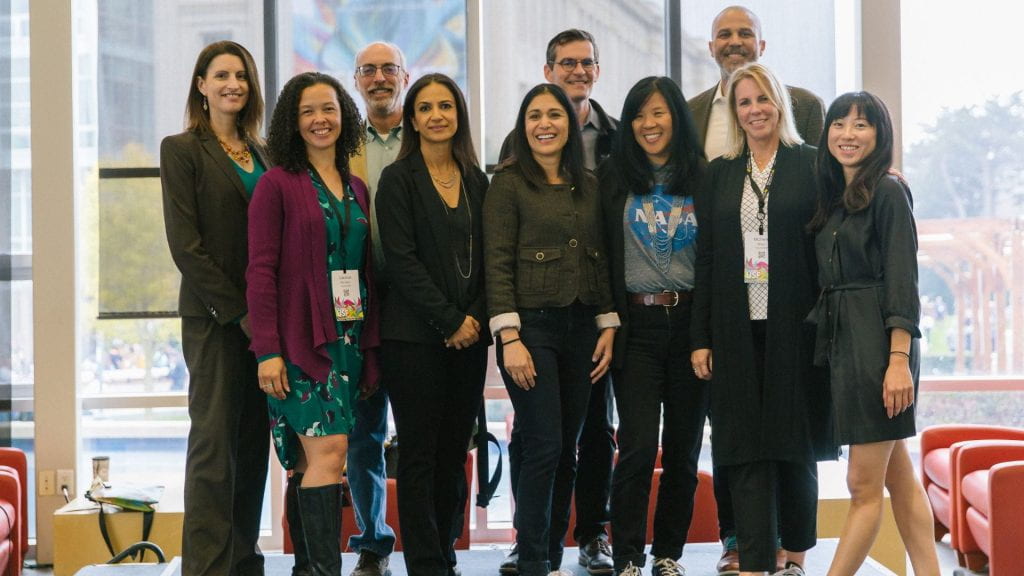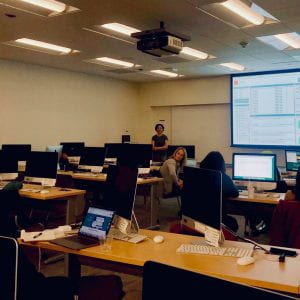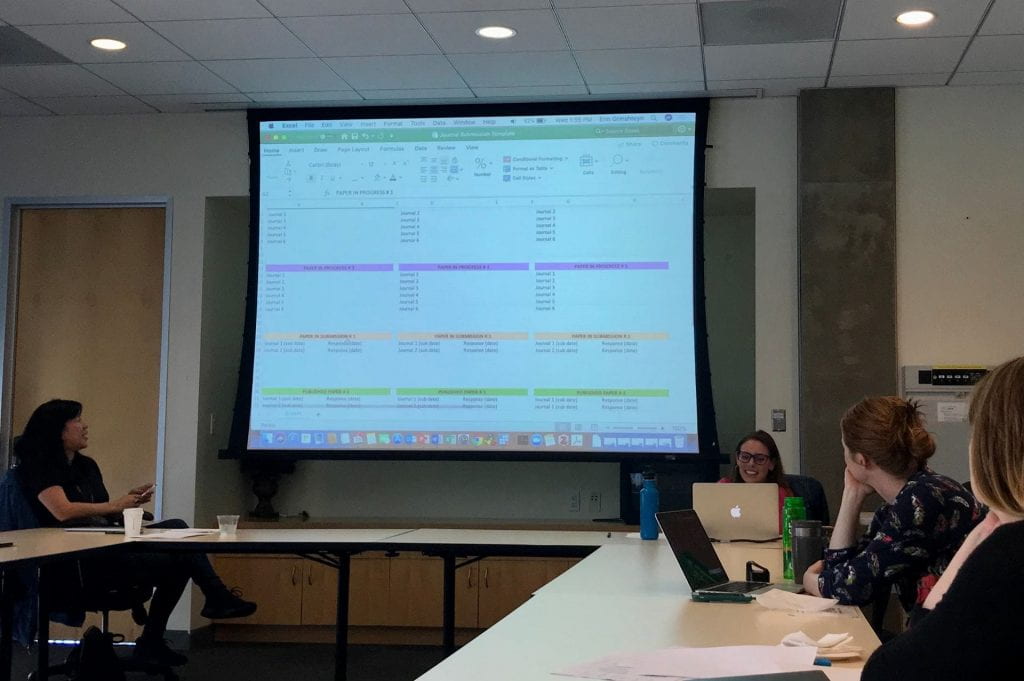Faculty Spotlight: Desiree Zerquera
Desiree Zerquera worked in student affairs, higher education policy, and research before becoming a faculty member at the University of San Francisco (USF), and her experience led her to her current research focusing on universities in urban settings. Our conversation explored the intersections of academic policies, the effects on students, and the connections to USF.

Desiree Zerquera
How did you first become interested in research?
When I was in college, it really illuminated both that I was marginalized in classrooms–there weren’t a lot of people of color, there weren’t a lot of women in my math major–but then also recognizing the privilege that I had. There were microphones that I had that other people didn’t, so how can I best leverage those privileges so that they’re utilized for change? In my master’s program, I worked with faculty who really stimulated my curiosity and let me ask questions and find answers to those questions. I wanted to work in higher education to have a greater impact and see that impact through research. As I went into my PhD, I was really focused on how research can inform the policy arena because for me research was all about finding a way to change and inform change in the world.
What were some of the early questions when you were starting out?
My master’s thesis focused on Latinos in community colleges. There’s a lot happening with the Latino community, but I was disappointed that Latino’s were talked about in this really pan-ethnic way, absent of the diversity in experiences. I recognized my own privilege as the child of Cuban immigrants who were able to get political asylum when they came to the U.S., so their immigration journey was one of privilege even though we’re working class. I was aware that there’s something different for us than there is for other groups, and we should be paying attention to the differences to better serve Latino students.
What’s the shape that your research has taken now?
The work that I’ve done since really focused on these types of institutions that are in urban areas that do research, teaching, and service. They’re focused on serving their cities and urban students, and they see their identity as being part of those urban surroundings. There’s a growth of these institutions, which are called urban serving research universities.
What’s happened over time is this perpetual framing of these universities as being less than, but these are the universities that have traditionally served Latinos, African American and black students, and low-income students because they have this commitment to serve their urban surroundings. At the same time there’s this framing in higher ed of excellence and what excellence means, but that framing doesn’t value the contributions of urban-serving research universities. You don’t get a higher ranking for the number of Latino students or black students you graduate. You get a higher ranking for the number of students you say can’t come here. This framing doesn’t fit with what these institutions do. I look at the ways these institutions are stuck in this tension of serving this equity agenda while also trying to compete for prestige in this oppressive way.
Some of my work has looked at the relationships between pursuing excellence in this framework and what that has meant to access for Latino and black students. I’m talking to administrators in these contexts to better understand the balance that they try to achieve, to what extent is equity part of that conversation, and to what extent is it fitting within this dominant paradigm or is there reclaiming of this space to do it differently, which is essential for fighting the stratification of higher ed where students are funneled in particular ways away from opportunity.
What are your current projects?
In addition to the work with urban universities I just described, I’m also doing work with formerly incarcerated students, and I think about the consequences of policies that structurally keep people out and keep people down. They have to change their major so many times because they find out they won’t be able to get a job with their major because they have a criminal record, and they’re misinformed, miscounseled, and misguided about what opportunity looks like.
What I intend to do with that research is to create workshops for practitioners and write policy briefs that reach campus administrators as well as people in Sacramento.
How does policy factor into your research?
My work focuses on the structuring of opportunity, so I naturally look at policy—financial aid policy, admissions policies. Policy is central to my research, but I know if I’m publishing in an academic journal, chances are that policymakers are never going to see it.
When I say policy, I’m not just thinking of Sacramento—I’m thinking of people who are making policies that affect higher ed. For me, that includes my students working in student affairs. They’re making policies about college campuses, so I make a real effort to articulate my research in different venues. There are certain journals for associations like the National Association of Student Financial Aid Administrators. I’ve published there intentionally because I want to reach people who are going to use this information in a way that benefits students.
How do your students inform your research and teaching?
I learn so much from students. I try to make spaces in the classroom where people are able to address issues that are relevant to them and apply the different frames and the different skills. The students I work with are doing work that matters.
I really appreciate that the students are working and directly applying what we’re talking about in their work settings, and they’re bringing the issues from work to class for us to talk about. I learn so much from their process. I learn what are issues of relevance based on what the students bring to the class discussion, and I just learn so much that I can take back and reflect on my own praxis as a researcher and how do I make this matter.
How do you bring your research into the classroom?
Before teaching, I remind myself of that ripple effect this class could have. The students want to be leaders in organizations—higher ed organizations, K-12 organizations, etc. I try to integrate organization theory with critical perspectives that reveal power structures and power dynamics. I want students to be able to navigate that world as well and to challenge it and push it, so when they’re making decisions, they can bring another perspective that asks critical questions. My students have to do papers that talk about problems and find solutions. My doctoral students write a traditional academic paper, op-eds, and an organizational report so they get three different types of writing. They need to know how to navigate these different worlds, to articulate their points of view, and how to advance our better understanding in those different arenas.
Since you inhabit all this knowledge of critical theory and ways of seeing systems, how do you know where to focus your research attention?
I’m in a privileged place where it’s my job to ask these questions. There are people who ask these questions everyday but they’re busy with putting out fires. This student just got evicted. That student no longer has financial aid. You have the practitioners doing that work. You have administrators who are dealing with how do we get enough money to keep the university going. If they don’t, then they won’t have a university to support anyone. You have all of these people that are in positions that don’t always enable them to think in this way, but I’m in a privileged space where it’s my job to think about these things. It’s not enough to write about these things in a journal that no one reads. It’s part of my responsibility to make sure that it’s articulated in ways that reach people.
How has being at the University of San Francisco affected your research?
At USF, there’s a lot of discourse about doing publicly engaged scholarship, so research that’s grounded in communities. That’s the same kind of conversation that’s happening at these universities. I see a lot of parallels between these institutions that are of real interest to me and the fulfillment of the Jesuit mission within the context of decreased financial resources. It overlaps with what I think about in my research—how do we make sure, that within all these discussions about our decisions for financial viability, for survival, that we’re also keeping focus on our social justice mission. I’d like to contribute to literature around Jesuit universities so we can learn from these urban-serving research universities to inform Jesuit universities.
How is your research connected to the USF community?
Thinking of my work with these urban serving research universities, I see direct connections with what I see happening at USF. USF has a strong social justice mission and also has pressures to survive. There’s always these tensions in admissions, tuition, the types of students that are targeted for recruitment, so I see the research helping me better understand. I bring that with me in my roles that I have on campus—understanding the tension and how USF is finding ways to survive and to better serve the students. USF is doing such important work collectively—administrators, faculty, students—and at the same time there are these really strong tensions and difficulties that need to be navigated. I think the greater challenge is figuring out how to do that well, how to be most impactful.
![INSIDE CRASE [Backup Jan 2021]](http://usfblogs.usfca.edu/crase/files/2018/02/crase_logo-1nupzm8.png)



Leave a Reply